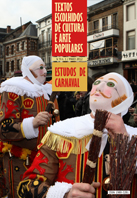CARNIVAL, A TERRITORY OF CRISIS: THE FORCES INVOLVED IN THE "BEGGAR CHRIST" AFFAIR (BEIJA-FLOR, 1989)
DOI:
https://doi.org/10.12957/tecap.2012.10308Keywords:
CARNAVAL, CRITICISM, POLITICAL DEBATE, ALLEGORY.Abstract
The political debates intertwine with the carnival research in the areas of sociology, anthropology and art theory, from European history to Brazilian one, and from the Renaissance to contemporary cultures, invading the Roman Saturnalia as much as the current "sambadromes". The presence of critical academic studies in various subjects such as Rabelais, communitas and the samba schools of Rio de Janeiro shows that the political issues distribute the periods of crisis in carnival while that, paradoxically, seems to gain strength from them. This paper draws a brief background of the carnival critics and analyzes politic issues of a work of art in which opposing forces face each other in the carnival samba school competition in Rio de Janeiro: the "Beggar Christ" (Beija-Flor, 1989).Downloads
Published
2012-05-01
How to Cite
Lima, F. C. de, & Filippo, B. (2012). CARNIVAL, A TERRITORY OF CRISIS: THE FORCES INVOLVED IN THE "BEGGAR CHRIST" AFFAIR (BEIJA-FLOR, 1989). Textos Escolhidos De Cultura E Arte Populares, 9(1). https://doi.org/10.12957/tecap.2012.10308
Issue
Section
Articles
License
Autores que publicam nesta revista concordam com os seguintes termos:- Autores mantém os direitos autorais e concedem à revista o direito de primeira publicação, com o trabalho simultaneamente licenciado sob a Licença Creative Commons Attribution que permite o compartilhamento do trabalho com reconhecimento da autoria e publicação inicial nesta revista.
- Autores têm autorização para assumir contratos adicionais separadamente, para distribuição não-exclusiva da versão do trabalho publicada nesta revista (ex.: publicar em repositório institucional ou como capítulo de livro), com reconhecimento de autoria e publicação inicial nesta revista.
- Autores têm permissão e são estimulados a publicar e distribuir seu trabalho online (ex.: em repositórios institucionais ou na sua página pessoal) a qualquer ponto antes ou durante o processo editorial, já que isso pode gerar alterações produtivas, bem como aumentar o impacto e a citação do trabalho publicado (Veja O Efeito do Acesso Livre).

